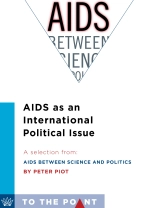Peter Piot, founding executive director of the Joint United Nations Programme on HIV/AIDS (UNAIDS), reports on the influence of civil society in international relations and traditional partisan divides. AIDS thrust health into national and international politics where, he argues, it rightly belongs. The global reaction to AIDS over the past decade is the positive result of this partnership, showing what can be acheved when science, politics, and policy converge on the ground. Piot describes funding mechanisms for AIDS, the first international declarations, the response of the UN system, the establishment of UNAIDS, the response of high income countries to AIDS, The Global Fund and PEPFAR as game-changers, and lessons for other health problems.
Spis treści
AIDS as an International Political Issue
Notes
O autorze
Peter Piot is the director of the renowned London School of Hygiene & Tropical Medicine and a professor of global health. He is a former Under Secretary General of the United Nations, the founding executive director of UNAIDS and former president of the International AIDS Society. He has published more than 500 scientific papers and articles, and sixteen books, including his memoirs, No Time To Lose: A Life in Pursuit of Deadly Viruses.Laurence Garey is an anatomist, former member the Court of Examiners, Royal College of Surgeons of England, and the Council of the Anatomical Society. He has translated works from French and German, including Jean-Didier Vincent and Pierre-Marie Lledo’s The Custom-Made Brain: Cerebral Plasticity, Regeneration, and Enhancement, and others by Jean-Pierre Changeux, Michel Jouvet, and Michel Meulders.












